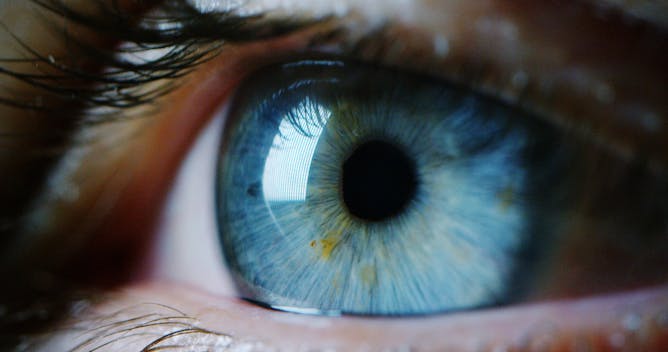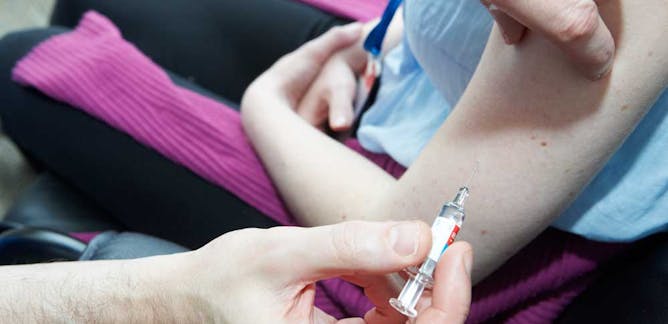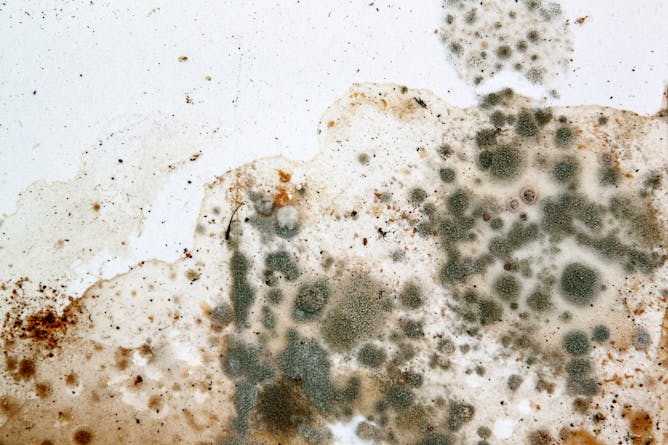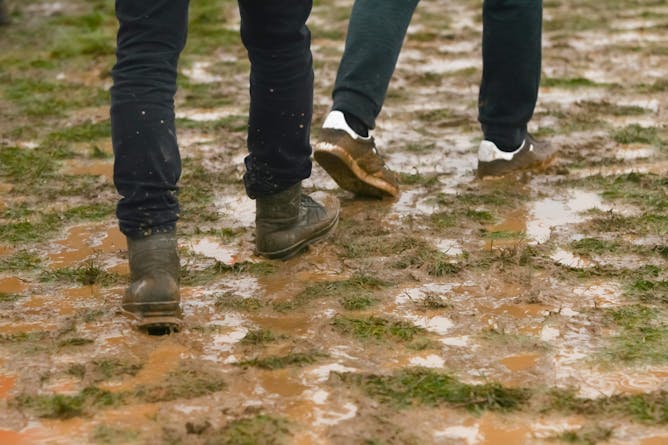|
|
|
Your weekly dose of evidence
|
|
Rates of the sexually transmitted infection syphilis reached an all-time low in 2010 but since then have grown by a massive 250%. Starting with small ulcers and rashes, the disease can eventually affect the nervous system and cause unusual symptoms such as inflammation of the eye and, eventually, blindness. The good news is it can be rapidly diagnosed with a simple blood test and is easily treated with low-cost antibiotics.
|
Fron Jackson-Webb
Deputy Editor/Senior Health + Medicine Editor
|

|
|
|
|

Syphilis can cause vision loss, and it’s on the rise.
from www.shutterstock.com
Justine R. Smith, Flinders University; João M. Furtado, Universidade de Sao Paulo
As ophthalmologists, we've noticed an uptick in cases of vision problems caused by syphilis. Practising safe sex is important for our eye health too.
|
From the archives: STIs
|

Mark Blaskovich, The University of Queensland
Superbugs used to pose the greatest risk to people with compromised immune systems and those who had surgery. But their sexual transmission means antibiotic resistance can spread much more widely.
| |

Dave Hawkes, University of Melbourne
A new study has found rates of genital warts have decreased significantly since the HPV vaccine was introduced.
|

Deborah Bateson, University of Sydney
Many people find the idea of a sexual health check awkward or embarrassing. But there are simple things you can do, or be aware of, to make your next check up more comfortable.
| |

Rob Knell, Queen Mary University of London
Researchers show that a sexually transmitted disease similar to gonorrhoea could have got rid of promiscuous behaviour in agricultural societies.
|
|
|
Expert answers to serious, weird and wacky questions
|

Feeling itch is a warning from your skin.
from www.shutterstock.com
Yuan Lei, Chinese Academy of Sciences; Yan-Gang Sun, Chinese Academy of Sciences
Itch is usually caused by something harmful, or something our body assumes might be harmful when actually it's not.
|

The heat makes the drought even worse, because it makes the plants more thirsty so they have to drink more.
Tim J Keegan/flickr
Albert Van Dijk, Australian National University
We can't make it rain. But you are already helping if you don't use more water than you need. And you can talk to your parents about the planet getting warmer, because the heat makes drought worse.
|
|
|

Terry Goldsworthy, Bond University
As a police officer, I was involved in many pursuits, investigated serious accidents and later became a researcher. Here's what I've learned about how police make decisions in a pursuit.
| |

Estelle Trengove, University of the Witwatersrand
Why is thunder so loud? It's because the amount of electrical energy that flows from the cloud to the ground is so enormous.
|
|
|
Top picks from the week
|

Mould isn’t just unsightly – it can be dangerous for our health.
From shutterstock.com
Michael Taylor, Flinders University
The aftermath of flooding provides the perfect breeding ground for mould in our homes. It's important to properly remove it so it doesn't affect our health.
|

People typically become sick between one and 21 days after being infected.
Goran Jakus/Shutterstock
Sanjaya Senanayake, Australian National University
The bacteria that causes melioidosis usually lives 30cm underground in clay soil but is dredged to the surface during heavy rains and floods, and can enter the body through small breaks in the skin.
|

Happiness is a warm puppy.
Joe Caione/Unsplash
Bronwyn Orr, University of Sydney
Recognising animals as sentient means welfare laws must consider animals' feelings as well as their physical conditions.
|
|
|
| |
Featured jobs
|

|
University of Melbourne — Melbourne, Victoria
|

|
RMIT University — Melbourne, Victoria
|

|
Macquarie University — Macquarie Park, New South Wales
|

|
Griffith University — Nathan, Queensland
|
|
|
|
| |
| |
| |

|
| |
| |
| |
Featured events
|

|
31 Constitution Ave, Canberra ACT , Canberra, Australian Capital Territory, 2601, Australia — Universities Australia
|

|
Seminar Space Level 4, Lowy Research Centre, Gate 9 High St, UNSW Sydney, New South Wales, 2052, Australia — UNSW
|

|
National Press Club , Canberra, Australian Capital Territory, 2600, Australia — University of Sydney
|

|
UNSW Sydney, Kensington, New South Wales, 2052, Australia — UNSW
|
|
|
|
| |
| |
| |
| |
| |
|
|
|
|
|
|
|